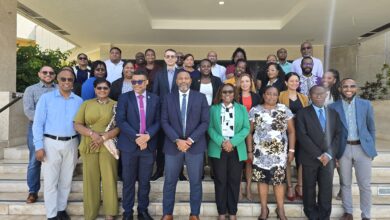1. The Third UK-Caribbean Forum, hosted by the Government of Guyana, took place in Georgetown, Guyana from 3 to 5 April, 2002. The Forum was co-chaired by the Hon. S.R. Insanally, Minister of Foreign Affairs of Guyana, and current Chairman of the CARICOM Council for Foreign and Community Relations (COFCOR) and from the UK side, the Rt. Hon. Jack Straw, the Secretary of State for Foreign and Commonwealth Affairs and Baroness Amos, the Foreign and Commonwealth Office Minister responsible for UK-Caribbean Relations. The Opening Remarks of the Co-Chairs and the Secretary-General of CARICOM who chaired the Opening Ceremony are attached.
2. Observers included Cuba, the European Commission, the Secretariats of CARICOM and CARIFORUM and several regional and non-Governmental Organisations.
3. The agenda for the Forum was determined by the priorities set by the Heads of Government of CARICOM and of the UK at their meetings in Kingston, Jamaica in July 2001 and in Coolum, Australia in March, 2002, and the Report of the Ministerial Task Force, mandated to examine the UK-Caribbean relationship.
4. The Forum was designed to enhance and develop the longstanding and special relationship between the UK and Caribbean Governments, to discuss issues of common concern and set strategic priorities for future cooperation. The Third Forum helped to reaffirm the importance of this objective.
5. Discussions covered a wide range of issues including international developments; regional security; trade and sustainable development; finance and investment; HIV/AIDS; administration of justice; education and culture.
Caribbean-UK Relations
6. UK and Caribbean Ministers highlighted the continuing importance of the UK-Caribbean relationship in a globalised and inter-dependent world. They stressed that considerable scope existed for a broad and enhanced relationship which builds on those sustaining elements of historical ties while implementing practical areas of cooperation and a strengthened political dialogue on issues of common interest. They acknowledged the overall health and strength of the relationship and the progress that had been made in improving it through the Forum process. They pledged to work closely together to continue the progress made and welcomed the improvements to the Forum process agreed by Heads of Government. The UK reaffirmed its commitment to support Caribbean led initiatives to address the challenges facing the Region.
Review of International Developments and the Possible Impact on UK-Caribbean Relations
7. Ministers discussed international developments. They acknowledged in particular the impact of the terrorist attacks of 11 September 2001. They recognised that the effect of terrorism on the Caribbean is costly, in terms of improving security, the loss of income from tourism and harm to the investment climate. They agreed to explore ways to address the adverse effects on the Caribbean and to continue to work together in the global fight against terrorism.
8. The Forum acknowledged the cost implications for Caribbean countries of meeting the requirements of United Nations Security Council Resolution 1373. It noted the concern of the Region that although the World Bank had supported countries in meeting these cost, under its criteria, such funds would not be available to a number of CARICOM countries. It also noted that the Caribbean Development Bank is considering allocating finance for security from approved funds to countries which will not receive funding directly from the IFIs. The Forum welcomed the agreement of the UN Secretary-General to establish a Trust Fund administered by UNDP to secure assistance in this area.
Regional Security and Law Enforcement
9. Ministers emphasised the priority their governments accorded to improving the security of the Caribbean Region by combatting drugs and arms trafficking, crime, especially violent crime, and money laundering. They committed themselves to work closely together and with others to achieve their aims. Ministers recognised that much had been achieved under the Barbados Plan of action. They looked forward to the proposals by CARICOM to carry the fight forward. They agreed to work together to galvanise support from the international community.
10. The Caribbean requested further support from the UK for projects on a Regional Demand Reduction Strategy for drugs and the recommendations of a Task Force on Crime and Security among other things, to isolate the fundamental causes of increasing levels of crime. The UK agreed to consider areas for collaboration.
11. Caribbean Ministers welcomed increasing UK-Caribbean cooperation on support for law enforcement, such as the Regional Search Centre, that had emanated from the last Forum and agreed to continue and develop it. Caribbean Ministers welcomed the UK offer to fund a second phase of support for law enforcement, focussing on capacity-building in policing, prisons and customs services. The UK side confirmed that it would continue to support Caribbean public sector reform initiatives including those strengthening the justice sector and the police.
Sustainable Economic Development, Trade and Investment Issues
12. Ministers exchanged views on approaches to the negotiations of new ACP-EU Trade Arrangements and WTO compatibility. They agreed that the outcome of the negotiations, which should commence in September 2002, will change ACP-EU trading relations including UK-Caribbean trading relations. They recognised that special attention would have to be given to the adjustments needed by the Caribbean to build its internal economic capacity in preparation for the new global realities including the end of their non-reciprocal preferential access to the EU markets. They undertook to work together in the context of the Doha Work Programme so that Caribbean countries can derive greater benefit from international trade. In this context, the Caribbean appealed to the UK to give favourable consideration to the request for further strengthening representation of small states in the WTO. The UK confirmed that it would continue to provide specific support to the Regional Negotiating Machinery (RNM).
13. Ministers reaffirmed their Governments' intention to work together in the context of the need to address the challenges faced by small states which are particularly vulnerable to international developments and natural disasters which could affect their efforts at achieving sustainable development. They underscored the importance of the Commonwealth Secretariat maintaining pressure on other international institutions to implement fully recommendations of the Commonwealth Secretariat/World Bank Joint Task Force on Small States.
14. Ministers recognised the vital importance of the sugar industry to the economies of several Caribbean countries. Ministers also recognised the determined efforts being made to improved productivity and improved competitiveness. Caribbean Ministers emphasised that continued access to the EU market through the contractual Sugar Protocol and the Special Preferential Sugar arrangements was essential to sustaining the sugar industry and its effort to improve competitiveness. Ministers agreed that adaptation to changes in the ACP-EU trading arrangements, and the anticipated review of the Sugar Protocol should be carried out in this light and should contribute to the economic viability and social stability in the Caribbean countries.
15. Caribbean Ministers expressed their deep appreciation for UK support in the EU on the issue of market access for Caribbean bananas in the EU. They remained concerned over the effects of the new EU licensing arrangement on the UK market. They also expressed appreciation for the organisation of the conference on trade in organic and fair trade and agro products in London on 21 March 2002. The niche which such products offer is small but growing, and Caribbean Ministers expressed the view that it will be an essential component of a broader strategy to secure a place in the UK and wider European markets for its agricultural exports. UK support was particularly welcomed, given the discontinuation of the Commonwealth Development Corporation's involvement in the agricultural sector in the Region.
16. Both sides acknowledged the contribution of the tourism, rice and rum industries to the economic development of the Caribbean Region. The UK agreed to lend its support to the timely implementation of appropriate Caribbean projects in these areas funded by the European Commission.
17. Ministers welcomed the participation of private sector organisations in the Forum and the offer of the Caribbean-Britain Business Council to sponsor Caribbean projects. The Caribbean Association of Industry and Commerce (CAIC) drew attention to the need for greater facilitation of trade into the UK market, as market access meant more than free trade arrangements. The establishment of the British/Caribbean Chamber of Commerce was highlighted as a positive step in the relationship between the private sector in the Caribbean and the UK. The UK welcomed Caribbean commitment to the Caribbean Single Market and Economy (CSME) as an important step forward in improving the Region's competitiveness and are supporting CARICOM with technical assistance in the implementation process.
18. Caribbean Ministers expressed their desire for the regional private sector to be more creative and innovative in order to meet the challenges posed by a globalised world. They sought the support of the UK in stimulating a more entrepreneurial spirit within the Caribbean private sector and in raising its consciousness of the demands of the new international trading arrangements. The UK agreed to continue to provide advice and support to Caribbean Governments and organisations, including through private sector bodies.
19. The Caribbean side stressed the importance of the tourism sector, including eco-tourism, for its economic development. It was important, not only as a source of foreign exchange earnings and growth, but particularly to provide employment, create business opportunities and develop the Caribbean's human resources. Caribbean Ministers outlined the initiatives they were taking to grow tourism earnings from Europe, and to increase airlift into the Region by UK airlines. They expressed their appreciation for the continued commitment of the Caribbean airlines.
20. Ministers noted the efforts made by the Region in recent years to bridge the digital divide. They recommended a meeting of Caribbean Ministers responsible for Information Communication Technology and Economic Industrial Development should be convened as a matter of urgency to explore ways in which the Caribbean could take advantage of information technology and establish a strategic plan to complete the task of bridging the digital divide. The UK is prepared to consider offering support to a project or projects designed to contribute to the implementation of the strategic plan.
21. Caribbean Ministers expressed concerns about the continuing loss of public sector workers especially teachers and nurses to developed countries and the effect on their development efforts. The UK agreed to support an assessment of the situation facing Caribbean countries and to explore ways of addressing the underlying causes.
22. Both sides welcomed the outcome of the Monterrey Conference on Financing for Development including the announcements from the EU and US on increasing aid volumes and the global commitments on aid effectiveness set out in the Monterrey Consensus. They agreed that these have created a platform for progress at the World Summit on Sustainable Development in Johannesburg from 26 August to 4 September 2002. Both sides acknowledged that the Summit would be critical to reinvigorating global commitment to sustainable development and accelerated action on Agenda 21 including for Small Island Developing States (SIDS). They urged Heads of Government to attend the Summit. Both sides agreed to build upon areas of common interest as they prepare for the Summit and to collaborate in advancing these interests prior to and during the Summit.
23. Ministers agreed on the need to improve Caribbean capacity to implement environmentally sustainable development initiatives. In this regard the UK expressed its willingness to consider a new joint initiative in the Caribbean through which environmentally sustainable development might be promoted.
24. The Caribbean side expressed its continued objection to the movement of nuclear waste through the Caribbean Sea and reiterated its concerns about the potential dangers of a mishap. The UK side stressed the stringent safety measures taken for these shipments, which are carried out in accordance with international agreements. The UK side confirmed that, subject to the necessary security requirements, it would continue to be open and transparent in the provision of information to countries in the region.
25. The UK reiterated its strong support for the International Whaling Commission (IWC) moratorium on commercial whaling and offered to work with Caribbean IWC members to promote the non-lethal use of cetaceans, for example by encouraging whale watching. The UK hoped Caribbean IWC members would consider any proposals to establish whale sanctuaries. Caribbean Ministers reiterated their support for the principle of sustainable use of marine resources and underscored their continued adherence to the relevant international conventions including the ICRW and CITES.
26. Ministers continued to express concern about the consequences of global warming and climate change, especially for vulnerable small island and other low-lying coastal states of the Caribbean. Caribbean Ministers emphasised the importance of international recognition of the Caribbean Sea as a Special Area in the context of Sustainable Development. They welcomed progress made by the Iwokrama Rain Forest Centre in Guyana in conserving and sustainably utilising tropical rain forest resources. The UK expressed its support for the Iwokrama Rainforest Centre, and its intention to assist the Centre to achieve more sustainable funding arrangements for its work in the future.
27. The Forum recognised the extensive help the UK had provided for disaster relief and management. The UK confirmed its readiness to continue to offer support to the Caribbean in its response to emergencies.
Finance and Investment Issues
28. Ministers agreed that the work of the OECD's Global Forum on Harmful Tax Practices should ensure a level playing field for all jurisdictions. They reiterated that the standards and time lines for non-OECD jurisdictions should be no more onerous than those for OECD members. Ministers noted that Caribbean jurisdictions will face increased costs as a consequence of the implementation of some aspects of the OECD's initiative.
29. Caribbean Ministers welcomed the UK-sponsored Feasibility Study on a Caribbean Inward Investment Office (CIIO) and indicated they will recommend the convening of a meeting of Ministers responsible for finance to consider a co-ordinated response.
30. The Caribbean expressed appreciation for the UK's continued contribution to various programmes of debt relief that had significantly helped several Caribbean countries. The UK confirmed its willingness to provide debt relief measures for all eligible CARICOM countries on the basis of the linkages to poverty reduction, good governance and prudent economic management.
HIV/AIDS
31. Ministers were particularly concerned at the growing incidence of HIV/AIDS in the Caribbean which places the Region second only to sub-Sahara Africa. Caribbean Ministers welcomed the support provided by the UK for the revisions to the regional strategic plan of action and urged the UK to continue to support the Pan-Caribbean Partnership Programme.
Education and Culture
32. Caribbean Ministers stressed the need for UK support in the development of learning outcomes and attainment standards or targets in core subject areas at the primary and lower secondary levels. The UK continues to make a significant investment in the education sector focussing primarily on access and quality issues.
33. Both sides reiterated the importance they attached to the education sector. The UK would continue to provide significant support for national efforts to improve education systems in the Caribbean. Ministers agreed to look at fostering wider contact between Caribbean and UK universities to build on and expand existing links, particularly in the fields of science and technology and curriculum reform. The UK said it would continue to seek more funding for University scholarships for scholars from the Caribbean. Ministers agreed on the need to consider more creative linkages such as those made through distance learning.
34. Both sides expressed continued support for culture and sport as important elements in the strengthening of relations. The UK looked forward to hosting the Commonwealth Games in Manchester in July of this year and would welcome full representation from the Commonwealth Caribbean.
Administration of Justice
35. The Caribbean side briefed the UK about the regional efforts to remedy the systemic problems in the justice systems and to improve the delivery of justice and the general efficiency of the legal systems.
36. The Forum noted that the UK side of the UK Caribbean Jurists' Group was operational. Caribbean Ministers recognised the need for a Caribbean counterpart to make the Group fully effective and urged the Caribbean Bar Associations to address this matter urgently. Ministers welcomed the proposed collaboration on projects as a result of the attendance of the Chair of the UK Group at the meeting of the Organisation of Commonwealth Caribbean Bar Associations (OCCBA) in Belize in January this year.
37. The Caribbean advised the UK on the progress towards the establishment of the Caribbean Court of Justice.
Deportation Policy
38. Ministers discussed the problems arising from the deportation of Caribbean nationals from the UK, including the criminal dimensions and the potential threat to international security, the negative effects on economic and social development in the receiving states, and the humanitarian aspects. Ministers agreed that these issues should be further discussed. Those discussions should cover the areas of procedures for removal, receipt of deportees and problems of resettlement and rehabilitation in the receiving state. It was agreed that Jamaica would provide the Caribbean lead in furthering the discussions.
Other Issues
39. Both sides recognised the importance of the upcoming Second EU-LAC Summit in Madrid to the enhancement of the bi-regional relationship. Caribbean Ministers outlined concerns which remain to be addressed in the preparatory process for the Summit.
40. The Forum extended deepest condolences to Her Majesty The Queen and the Royal Family on the passing of Her Majesty Queen Elizabeth the Queen Mother, particularly so soon after the death of Her Royal Highness Princess Margaret. They requested the UK delegation to convey these sentiments to the Government and people of the United Kingdom.
41. All delegations joined in congratulating Her Majesty The Queen on the celebration of her Golden Jubilee. They wished her the best of health as she continues her reign.
42. Ministers expressed their appreciation to the Government of Guyana for the warm hospitality extended in hosting this Forum. It was agreed that the next Forum will be convened in the UK in 2004.
Georgetown, Guyana
5 April, 2002





